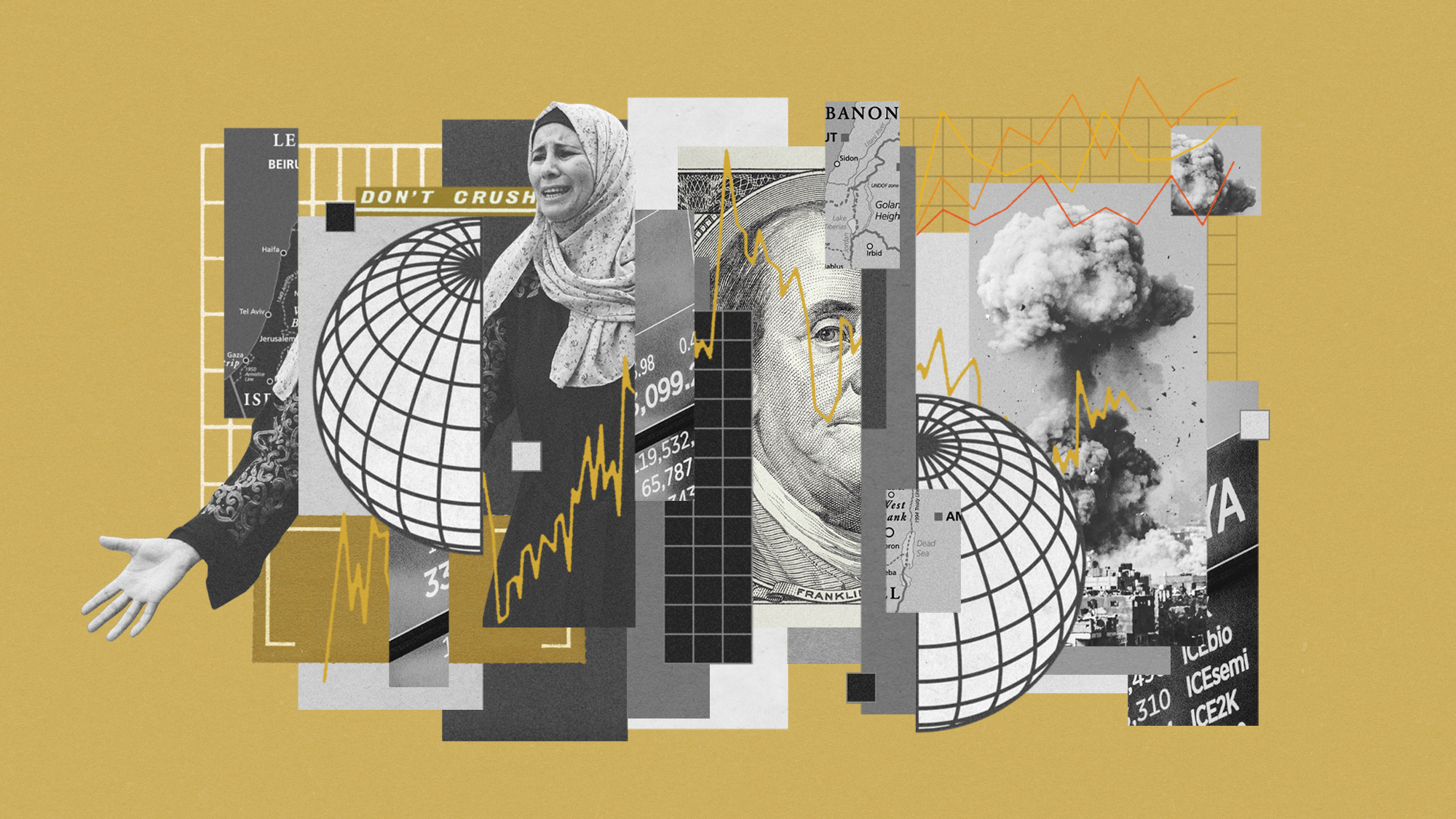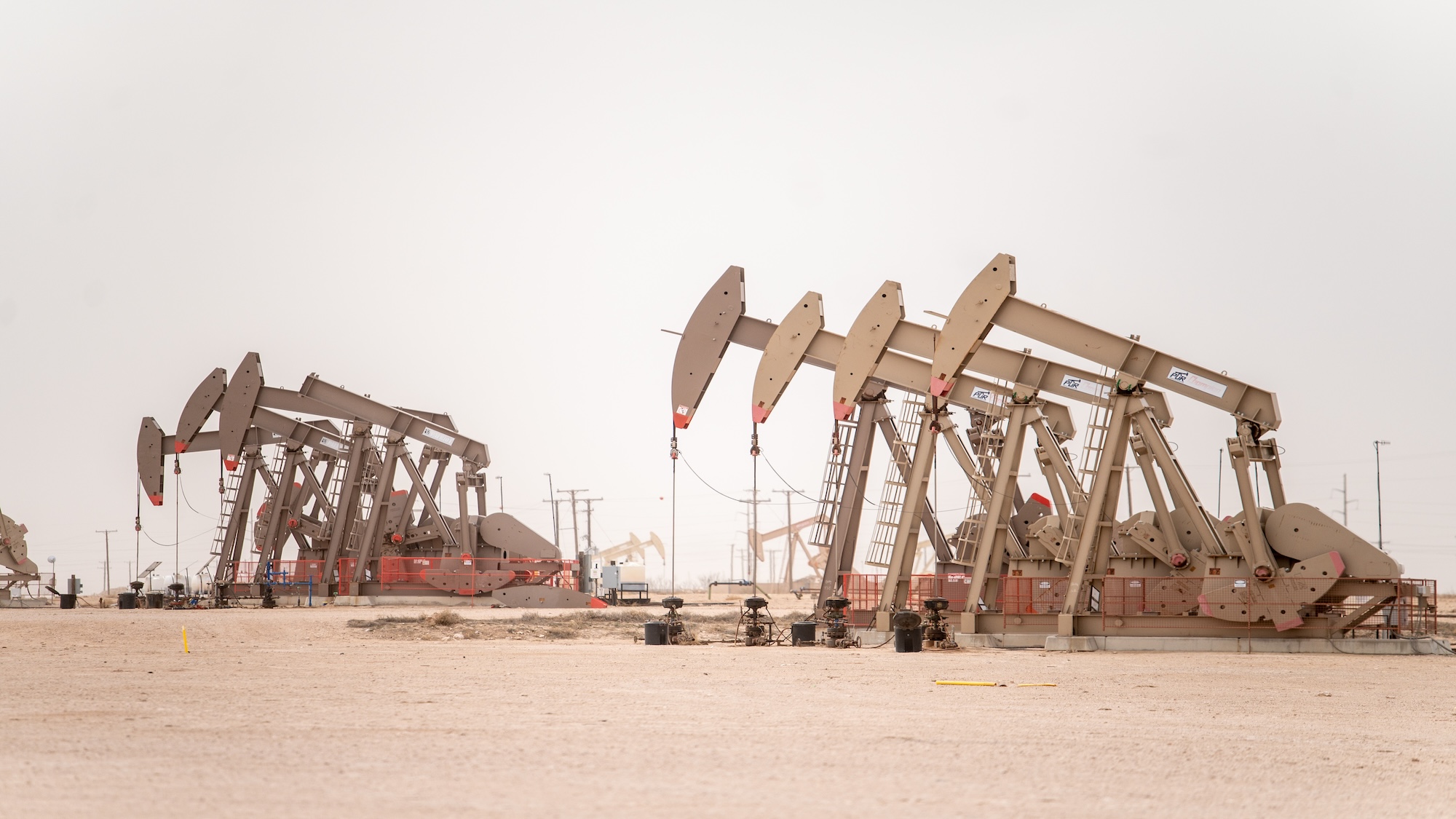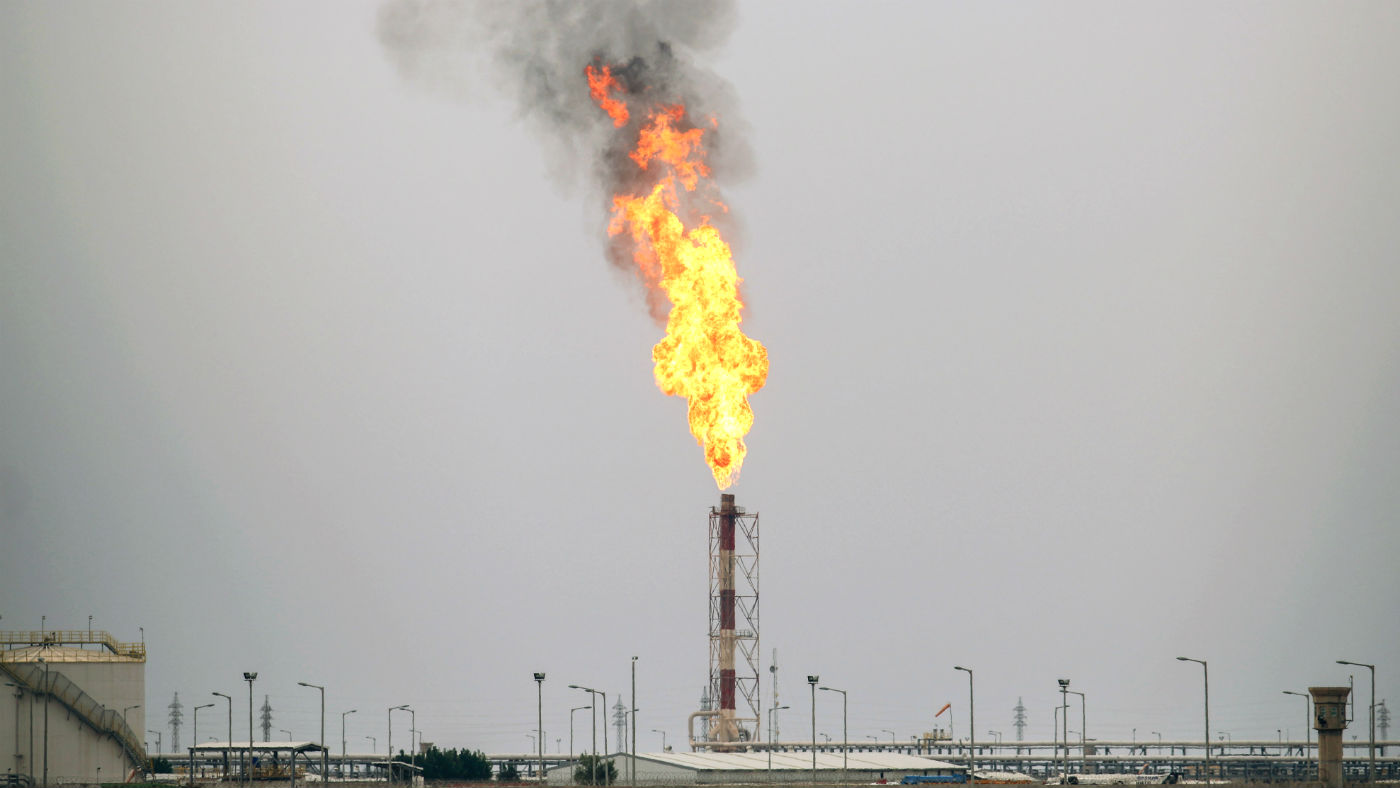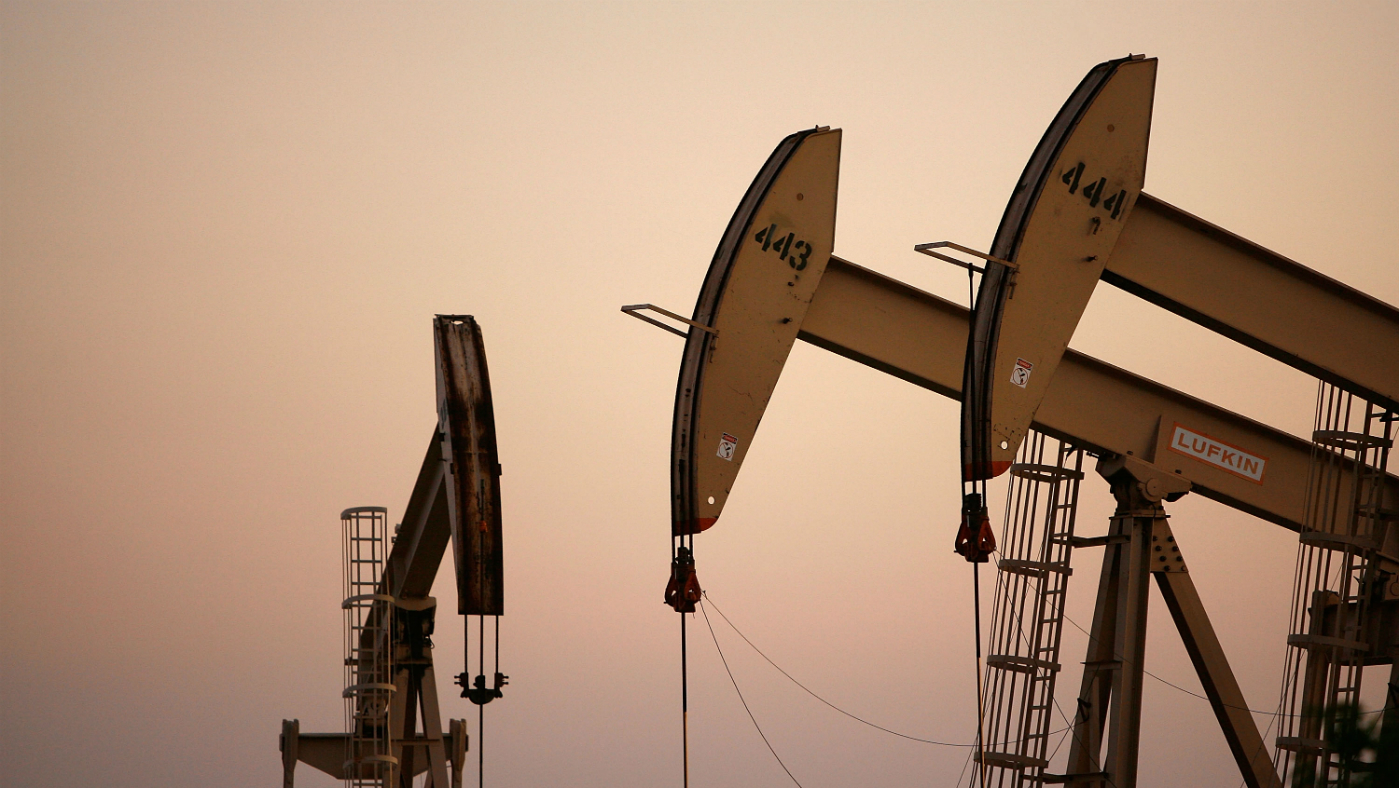Oil price posts two-year highs - but how long can it last?
Brent rose above $59 a barrel this week, its best third-quarter showing since 2004

A free daily email with the biggest news stories of the day – and the best features from TheWeek.com
You are now subscribed
Your newsletter sign-up was successful
Oil price surges after Saudi airstrikes on Yemen
26 March
Airstrikes against Yemen led to a sharp rise in the oil price as traders prepared for another round of instability in the Middle East.
Small gains yesterday were followed by a sharper rise today, pushing Brent crude to a two-week high of $58.50 per barrel, a rise of five per cent on yesterday's closing price.
The Week
Escape your echo chamber. Get the facts behind the news, plus analysis from multiple perspectives.

Sign up for The Week's Free Newsletters
From our morning news briefing to a weekly Good News Newsletter, get the best of The Week delivered directly to your inbox.
From our morning news briefing to a weekly Good News Newsletter, get the best of The Week delivered directly to your inbox.
Analysts suggested that military action in Yemen had served to correct oil prices, which had drifted lower than was justified.
"The higher the oversupply on the oil market became in recent months the more the geopolitical risks were ignored," a commodities analyst at Commerzbank told the Daily Telegraph. "These have suddenly come back into sharp focus, however, following the Saudi-led military air strikes carried out by ten Gulf states against the Houthi rebels in Yemen."
Concerns about oversupply remain, but even before Saudi Arabia's action in Yemen the oil price had begun to creep back up, in part due to growing business confidence in Europe.
Germany, the continent's biggest economy, saw business morale grow for the fifth straight month, according to the Ifo Institute for Economic Research.
A free daily email with the biggest news stories of the day – and the best features from TheWeek.com
Ifo's business climate index, which is based on a monthly survey of 7,000 firms, increased from 106.8 in February to 107.9 in March, leading to expectations that demand for oil would increase, Reuters says.
Stephen Davis, the CEO of Signal Investment Research, said that in his view oil prices have fallen "too far too fast" and should bounce back to $70 or $80 per barrel, CNBC reports.
Speaking before the overnight air strikes, Davis argued that the strength of global growth, the gradual return of demand for oil, and signs that a slowing US economy will weaken the dollar - which tends to force oil prices upwards, as crude is bought and sold in the US currency.
However, figures from Opec and the International Energy Agency suggest that supply is running at 1.5 million barrels per day above world oil demand. Analysts say that the imbalance is unlikely to be resolved until the second half of 2015, and until then will continue to exert downward pressure on the oil price.
Oil price unlikely to rebound, says Saudi official
23 March
Oil is unlikely to return to the record levels it hit over the past two years, Saudi Arabia's representative to Opec has said.
Hitting $100 to $120 per barrel would be "difficult", Mohammed al-Madi, Saudi Arabia's Opec governor admitted to an energy conference in Riyadh.
Brent crude, the global benchmark, fell by 46 cents in early trading on Monday to $54.74 per barrel at 10am GMT. West Texas Intermediate was also down 94 cents this morning to $45.56 per barrel.
Saudi Arabia is Opec's biggest producer and is often referred to as the de facto leader of the oil cartel. Asked if it was possible for the price to return to the highs of $100 to $120 per barrel that it enjoyed in recent years, Madi replied: "I think it's difficult."
Madi also denied that Saudi Arabia was allowing the price of oil to fall for political reasons, the BBC reports.
"There isn't any political dimension in what we do at the oil ministry – our vision is commercial and economic... We are not against anybody or against the [production of US shale gas]. On the contrary we welcome it, as it balances the market in the long run."
Saudi oil minister Ali al-Naimi said that the decision not to combat the market slump by cutting production, thereby propping up oil prices, was not designed to undermine rival oil-producing nations, such as Iran, Reuters reports.
"There is no conspiracy and we tried to correct all the things that have been said but nobody listens," Naimi said.
"We are not against anybody, we are with whoever wants to maintain market stability and the balance between supply and demand, and [with regards to] price the market decides it."
Oil price falls below $55 as Opec holds its nerve
19 March
The oil price dipped below $55 a barrel this afternoon after Kuwait said Opec had no choice but to keep production steady.
The announcement reversed yesterday's brief rally in the cost of Brent crude, which followed the US Federal Reserve's signal that it would soon raise interest rates for the first time since the US economy slipped into recession seven years ago.
The dollar fell sharply in reaction to the Fed's comments, raising the price of oil as well as metals priced in the currency, Reuters reports.
"One of the biggest headwinds we’ve had has been the rising dollar," Phil Flynn, an analyst at the Price Futures Group in Chicago told the Wall Street Journal.
But Brent's gains of almost $2 a barrel slipped away after the dollar snapped back by more than 1.5 per cent. At 3.30pm today, it was trading at $54.35. Since last June, the oil price has fallen from a peak of $115 per barrel, bottoming out at $45 in January.
The drop follows comments from Kuwait's oil minister, in which he said that Opec had no choice but to maintain its current levels of production. "We don’t want to lose our share in the market," Ali al-Omair said.
Oil investors and traders are monitoring a growing oil glut as supply remains steady despite the drop in global demand.
US crude inventories are now at their highest level since 1930. Crude stocks in the country went up by another 9.6 million barrels last week, according to data from the Energy Information Administration.
Traders are also concerned that the tank complex at Cushing, Oklahoma will reach capacity in the next few weeks, the Financial Times reports.
Andy Lipow, a Houston-based energy consultant, warned that if the US oil industry is to avoid a storage problem, something will have to give.
"We can’t continue on this pace indefinitely," he said. "In order to keep inventory from continuing to build, it will require that refiners kick up runs, domestic production levels off or starts declining or there's a reduction in imports."
US crude hits six-year low
17 March
Oil prices tumbled on Monday due to higher output in the US and Libya, and growing confidence that talks with Iran may result in oil sanctions coming to an end.
The US crude oil price fell by nearly $2 on Monday, reaching a six-year low of $42.85 before recovering slightly to close the day at $43.88.
The recovery may be short-lived, as growing American stockpiles raise the likelihood that prices will slip yet further. The construction of new storage tanks in Oklahoma, which can hold three million barrels more oil, could mean that US stockpiles hit record highs for a tenth straight week, Reuters reports.
However, the new Cushing facility may provide producers with a buffer, analysts suggest.
In recent weeks, oil traders had been concerned that US oil production would outperform the country's ability to store it, forcing the industry to "shut off their wells until growing demand caught up to shrinking supply", according to the Globe and Mail.
"The US is aflood with oil and other production points around the world are not letting up in their output," Gene McGillian, a senior market analyst at consulting firm Tradition Energy told Reuters. "The question is how much more oil can we take before the storage tanks hit capacity?"
Libyan production has also risen dramatically, to about 490,000 barrels per day. That is more than double the country's output two weeks ago.
And there are signs that the US and Iran may be moving closer to a nuclear deal that could result in the removal of sanctions against Tehran, allowing Iranian oil to flow more freely to the market.
Brent crude also took a hit in trading yesterday, closing down $1.23 at $53.44 after hitting a six-week low of $52.50 in intraday trading.
Oil price will fall further, warns International Energy Agency
13 March
Another sharp fall in the oil price is likely despite its recent rebound, the International Energy Agency warned on Friday.
The oil price dropped by more than 60 per cent between June 2014 and January 2015, but have recently shown signs of stabilising, the Daily Telegraph reports. Brent crude, the global benchmark, has bounced back from six-year lows to around $60 per barrel, while West Texas Intermediate in the US has fluctuated around the $50 mark.
But the Paris-based energy watchdog, the International Energy Agency, warned that further price drops are possible.
"Behind the facade of stability, the rebalancing triggered by the price collapse has yet to run its course, and it might be overly optimistic to expect it to proceed smoothly," said the IEA in its closely watched monthly oil market report.
Global oil prices have slumped due to a combination of oversupply and tepid demand. Opec's decision not to cut production in October last year also had an impact on the market.
In its report, the IEA said that the rebound was in part due to the mothballing of unprofitably American drilling rigs
"Steep drops in the US rig count have been a key driver of the price rebound," the report said. "Yet US supply so far shows precious little sign of slowing down. Quite to the contrary, it continues to defy expectations."
The IEA also identified "tentative signs" of a recovery in demand since the beginning of 2015.
However, it warned the markets that this upturn may prove deceptive "as it rests partially on one-off factors such as cold weather and a low point of comparison the previous year", the Telegraph says.
Global supply rose to 94m barrels per day in February, 1.3m barrels per day higher than in the previous February. The reduced supply from war-torn Iraq and Libya is being offset by higher supply from Saudi Arabia, Angola and Iran, the Financial Times says.
Oil price: bankruptcy threat as low oil prices bite
10 March
The Houston-based oil company BPZ became the second oil company to file for bankruptcy in two days as low oil prices continue to drive redundancies, belt-tightening and reduced drilling and exploration across the industry.
In a statement on Monday, BPZ chief Manolo Zuniga said that the decision to file for bankruptcy was due to "the industry downturn" as well as the company's difficulties in refinancing its debt, Fortune reports. "Our efforts to negotiate additional financing to fund business activities and pursue identified strategic alternatives were further impeded when oil prices plummeted and production growth faltered, creating additional obstacles to our restructuring efforts," Zuniga said in a statement.
On Sunday, another Houston-based oil company, Dune Energy, filed for bankruptcy protection citing falling oil prices as a factor.
The company explores and produces oil on 1.9 million acres both on- and offshore in Ecuador and Peru.
The news follows predictions from the Opec secretary-general that the crude oil market will recover in the second half of the year as demand picks up and producers trim their costs.
Opec Secretary-General Abdalla El-Badri said that according to the cartel's projections, consumption this year will increase by 1.2 million barrels a day, Bloomberg reports.
The price of crude oil has lost half its value since June last year, due to a growing oil glut and lower demand. In November, Opec decided not to reduce its oil production – a move that some analysts said was driven by Saudi Arabia's desire to take on the threat posed by US shale oil producers.
Defending the decision, El Badri said that production cuts would not have solved the problem. "If we made a cut in the November meeting, then we would have needed to make another cut in January, and then we would need another cut in June as supply will keep increasing from non-OPEC," he said.
Last month, insolvency experts warned that low prices have increased the number of British oil- and gas-related companies at risk of going bankrupt up by almost three quarters.
-
 Political cartoons for February 21
Political cartoons for February 21Cartoons Saturday’s political cartoons include consequences, secrets, and more
-
 Crisis in Cuba: a ‘golden opportunity’ for Washington?
Crisis in Cuba: a ‘golden opportunity’ for Washington?Talking Point The Trump administration is applying the pressure, and with Latin America swinging to the right, Havana is becoming more ‘politically isolated’
-
 5 thoroughly redacted cartoons about Pam Bondi protecting predators
5 thoroughly redacted cartoons about Pam Bondi protecting predatorsCartoons Artists take on the real victim, types of protection, and more
-
 How might the Israel-Hamas war affect the global economy?
How might the Israel-Hamas war affect the global economy?Today's Big Question Regional escalation could send oil prices and inflation sky-high, sparking a worldwide recession
-
 Recent mega-mergers could signal a turning point for the US oil industry
Recent mega-mergers could signal a turning point for the US oil industryTalking Point Both Chevron and Exxon have recently spent billions to acquire smaller oil companies
-
 Has Saudi Arabia lost control of oil prices?
Has Saudi Arabia lost control of oil prices?Today's Big Question Kingdom goes it alone to cut production, risking tension with US and reigniting cooling inflation in Europe
-
 US angered by Opec+ oil cut
US angered by Opec+ oil cutSpeed Read Energy prices to rise further as producers slash supply by two million barrels a day
-
 Global oil demand forecast lowered for 2020 and 2021
Global oil demand forecast lowered for 2020 and 2021Speed Read IEA report says jet fuel demand remains the major source of weakness
-
 Are US-Iran tensions flaring again?
Are US-Iran tensions flaring again?In Depth Trump threatens military action over Twitter
-
 Can a deal be struck to raise oil prices?
Can a deal be struck to raise oil prices?In Depth Opec+ will convene today over video link in a bid to boost crude
-
 What do negative oil prices mean?
What do negative oil prices mean?In Depth Perfect storm of oversupply and storage shortages sees producers paying to get rid of US crude